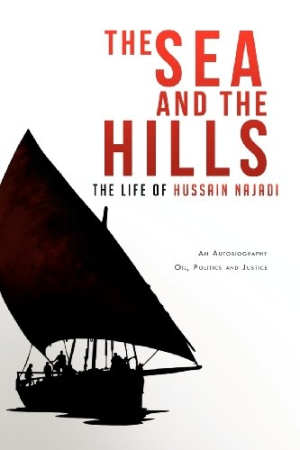The Sea and the Hills
The Life of Hussain Najadi
In his autobiography, a rags-to-riches-to-prison-garb story spiced with episodes of rebelliousness and revelation, international financier Hussain Najadi admits that he was a mischievous child. Najadi’s life is driven as much by hard work as by “kismet,” he believes: “Till today my life continues to be shaped by people who appear suddenly and propel me to new heights or save me from disaster or affect me in some other profound way.” It is these people and how he stumbles upon them that make The Sea and the Hills: The Life of Hussain Najadi an entertaining read.
The best part of the book is the first half, where Najadi writes cleverly and amusingly of his youth. His nostalgia for those heady days comes across in the early chapters, as he travels from his native Bahrain to Lebanon, Iran, Italy, Germany, Switzerland. He drops many little gems along the way, among them, “I’ve been an encyclopedia salesman. I know the hardest part is to get in the door. If you don’t get in, you can’t say a thing.”
Eventually, Najadi goes to Asia. There he sets up a unique development banking network aimed at gathering together Arab money, Asian labor and resources, and Western know-how.
As this son of “a vegetable salesman in the bazaar” rises in the world of international high finance, the reader travels with Najadi to meet with presidents, kings, ministers of state, and captains of industry (and banking). Here the story begins to blur, and it becomes a bit tedious as he boasts of the deals he makes. Fortunately for the reader, when a corrupt Bahraini official reminds him that “you’ve forgotten who you really are,” strips him of his wealth, and tosses him in prison, the story once again becomes very interesting.
Najadi shares little about his time in prison, most of which he spent reading. As a young boy, a teacher had told him that “good books make you think,” and Najadi did a lot of that in prison. In fact, his readings, along with other episodes in his life, inspired Najadi in his later years to turn his talents to a higher purpose. Now in his mid-seventies, the author muses on how “from a leftist idealist I had become a capitalist (with a conscience) and am now back to being an idealist, concerned with creating a more equitable world in which everyone is able to share the fruits of our global resources.” Rather than just amass personal wealth, Najadi devotes himself to “helping others make the most of what they have.”
The Sea and the Hills: The Life of Hussain Najadi, is more than just a memoir of a man with a talent for high finance. It is, as the cover notes, a story of “oil, politics and justice,” and it is the latter that makes the book a good and worthwhile read.
Reviewed by
Mark McLaughlin
Disclosure: This article is not an endorsement, but a review. The publisher of this book provided free copies of the book and paid a small fee to have their book reviewed by a professional reviewer. Foreword Reviews and Clarion Reviews make no guarantee that the publisher will receive a positive review. Foreword Magazine, Inc. is disclosing this in accordance with the Federal Trade Commission’s 16 CFR, Part 255.

